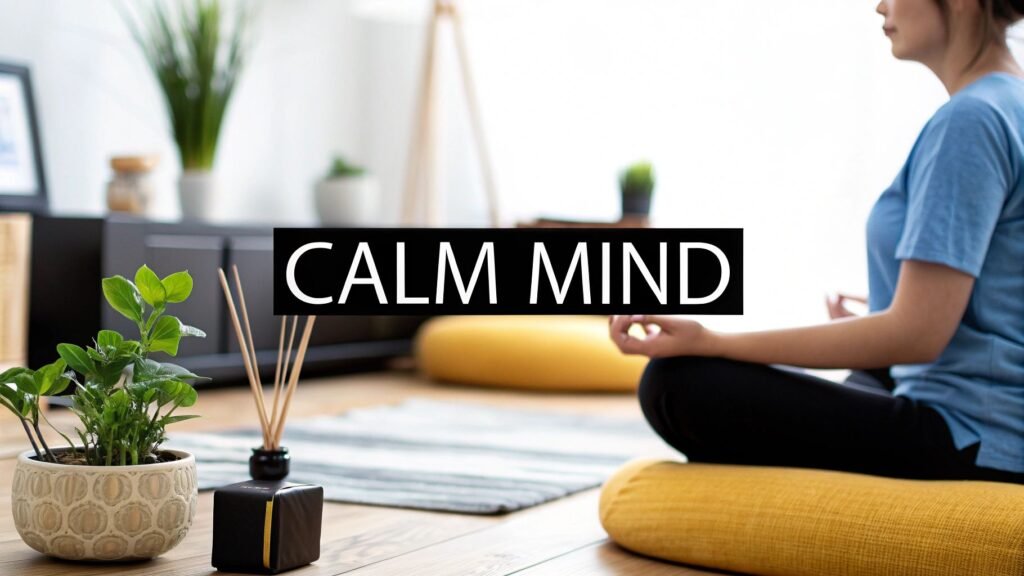It’s a question I hear all the time: Can you really treat anxiety effectively without turning to medication? The answer is a resounding yes. In fact, for many people, non-pharmaceutical approaches are the best first step. They get to the heart of the matter, helping you build real, sustainable skills to manage anxiety for the long haul, rather than just covering up the symptoms.
Your Path To Managing Anxiety Without Pills
Feeling the weight of anxiety is an all-too-common experience, but the journey toward relief doesn't have to end at the pharmacy counter. Choosing to manage anxiety without medication is a powerful, proactive decision. It’s about building a personalized set of skills and strategies—a mental toolkit, if you will—that you can pull from for the rest of your life. This gives you a true sense of control.
This approach is all about getting to know your anxiety—what triggers it, how it feels in your body, and how you can actively reshape your responses to it. And this isn't just wishful thinking; these methods are backed by solid research. Therapies like Cognitive Behavioral Therapy (CBT), for instance, are widely considered a gold standard and often produce results that are on par with, or even better than, medication, especially over time.
Why Non-Medication Methods Work So Well
So, what’s the secret sauce? Instead of changing your brain chemistry with a pill, these treatments work by changing your brain's patterns and your body's physical reaction to stress. You learn how to soothe your own nervous system, question irrational thoughts, and build resilience from the inside out.
The benefits here are significant:
- You build lifelong skills. These are coping mechanisms you’ll have forever, not just a temporary fix.
- You avoid side effects. Non-medication treatments don't come with the long list of potential side effects that pharmaceuticals can.
- You feel empowered. There's a profound sense of self-reliance that comes from knowing you have the tools to manage your own anxiety.
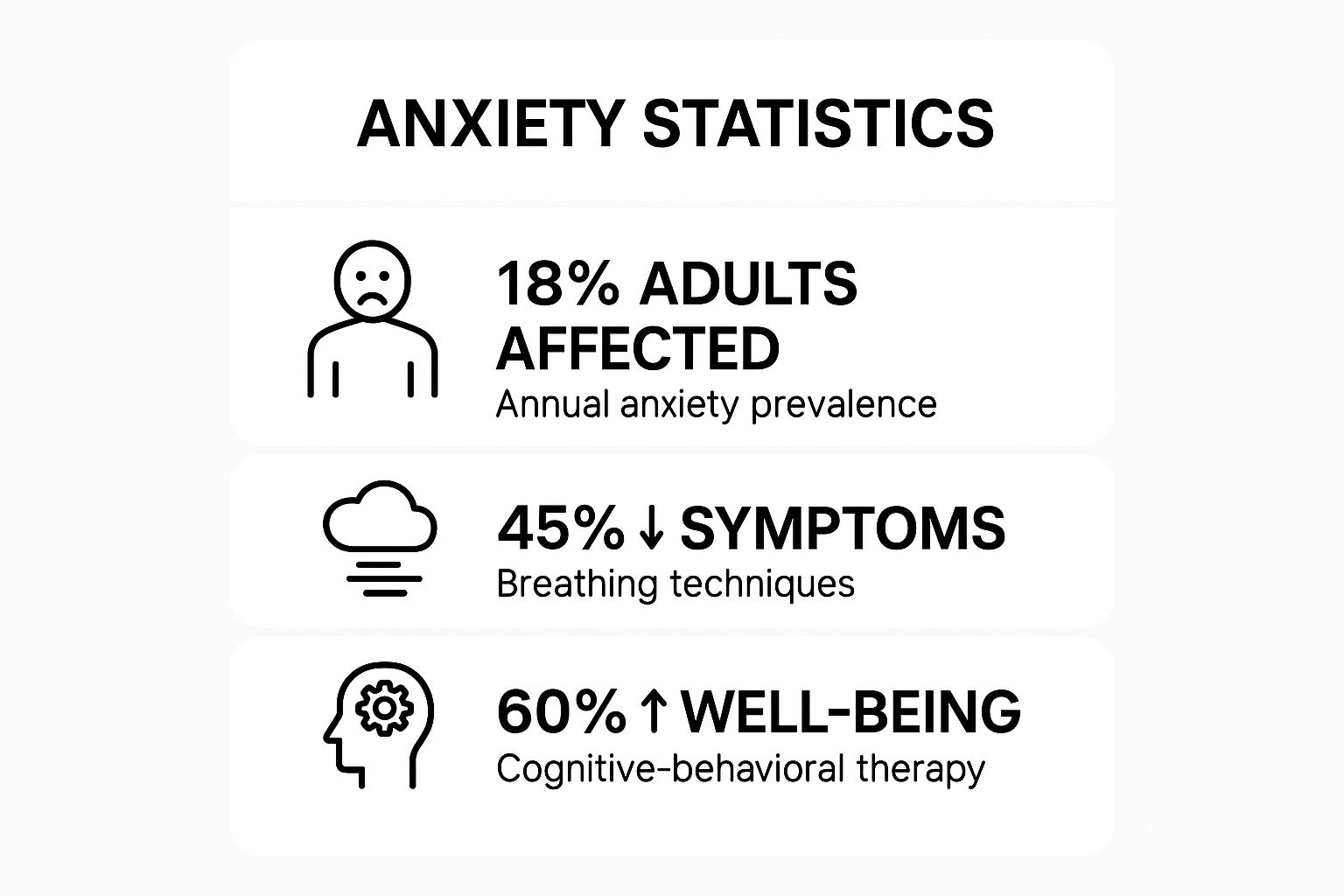
As you can see, even simple lifestyle adjustments can make a real difference, while structured therapies like CBT can lead to dramatic improvements in your overall well-being.
To give you a clearer picture, here’s a quick overview of the main non-medication strategies we'll be exploring.
A Quick Look at Non-Medication Anxiety Treatments
| Treatment Category | Core Principle | What It Involves |
|---|---|---|
| Psychotherapy | Re-patterning thoughts and behaviors that fuel anxiety. | Working with a therapist on methods like CBT or ACT (Acceptance and Commitment Therapy). |
| Mind-Body Practices | Calming the nervous system through intentional focus. | Techniques like mindfulness, meditation, deep breathing, yoga, and tai chi. |
| Lifestyle Adjustments | Building a foundation of physical and mental resilience. | Focusing on diet, exercise, sleep hygiene, and reducing caffeine/alcohol. |
| Herbal & Natural Support | Using botanicals and supplements to support mood. | Incorporating things like acupuncture, specific herbal formulas, or supplements. |
These approaches aren't mutually exclusive; in fact, they often work best when combined into a holistic plan that fits your unique needs and lifestyle.
Bridging The Treatment Gap
Even with all these proven strategies, there's a troubling disconnect. Anxiety disorders are the most common mental health conditions worldwide, affecting an estimated 301 million people. But shockingly, only about 27.6% of people with anxiety get any kind of treatment. You can read more about these global treatment statistics and the push for better access to care.
This guide is my effort to help close that gap. I firmly believe that knowledge is the first step toward feeling in control. By laying out clear, actionable information, the goal is to make effective anxiety treatment without medication feel less intimidating and more achievable.
We’re going to walk through the most effective non-medication strategies out there, from foundational therapies that rewire your thinking to simple techniques you can use in the moment for immediate relief. My aim is to give you a complete system to not just manage anxiety, but to truly thrive.
Building Your Mental Toolkit with Proven Therapies
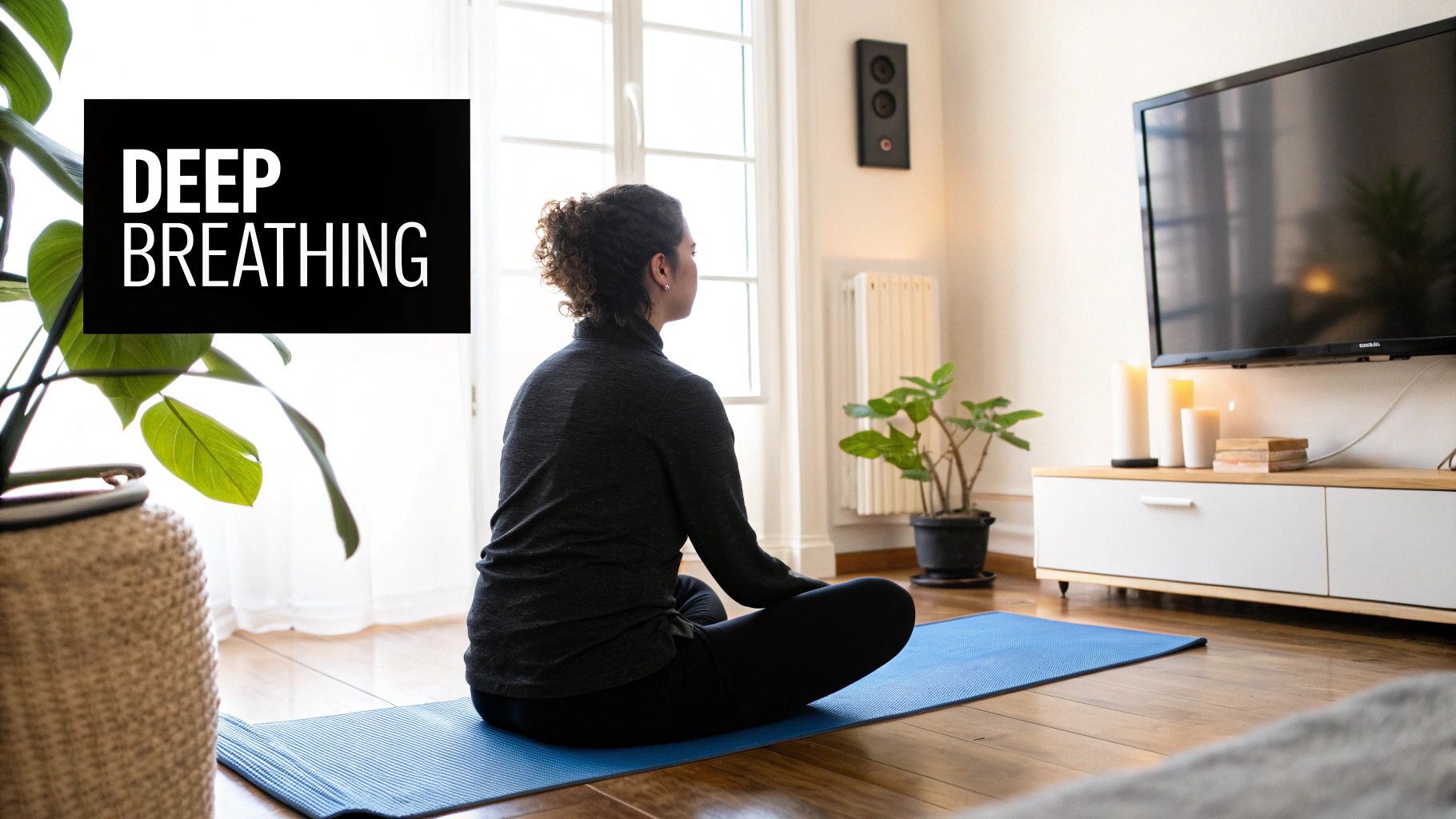
When you're looking for ways to treat anxiety without medication, the goal isn't just to make the feeling go away. It’s about building a solid foundation of mental skills you can rely on for the long haul. Think of it less like a quick fix and more like mental strength training.
At the heart of this approach, you’ll often find Cognitive Behavioral Therapy (CBT). It’s one of the most researched and effective non-pharmaceutical treatments out there for a reason. CBT works on a simple but powerful idea: our thoughts, feelings, and actions are all connected. Change one, and you can change the others.
The need for effective therapies like this is massive. A 2023 analysis from the University of Queensland revealed a staggering statistic: if the right treatments were available globally, we could avoid up to 71.1% of the health burden from anxiety disorders. Right now, only 12.5% of that burden is actually averted. That’s a huge gap, showing just how many people are missing out on these life-changing tools.
Putting CBT into Practice
CBT is less about theory and more about practical, hands-on work to rewire anxious thought patterns. The entire process boils down to three core actions: identifying, challenging, and reframing.
Let’s walk through a common scenario. Say you have a major presentation coming up at work next week.
- Identify the Automatic Negative Thought (ANT): The first thing that pops into your head might be, "I'm going to completely freeze up, and everyone will think I'm incompetent." That’s your ANT.
- Challenge the Thought: Now, it’s time to play detective. What’s the real evidence for this thought? Have you really frozen up every single time? Is it 100% certain that your colleagues will judge you so harshly? You might recall past presentations that went well or remember that your team is generally supportive.
- Reframe the Thought: Finally, you swap that ANT for something more balanced and realistic. Instead of, "I'm going to fail," you might reframe it as, "It’s normal to be nervous about this. I'm going to prepare well, and even if I stumble a bit, it’s not the end of the world. I can handle this."
Repeating this simple exercise over time actually trains your brain to default to more rational, less anxious pathways. It's a skill, and like any skill, it gets stronger with practice.
Expanding Your Toolkit Beyond CBT
While CBT is a powerhouse, it’s not the only tool for the job. Different approaches click with different people, and sometimes a combined strategy works best. Let’s look at two other highly effective therapies: Acceptance and Commitment Therapy (ACT) and Dialectical Behavior Therapy (DBT).
Acceptance and Commitment Therapy (ACT)
ACT comes at anxiety from a slightly different angle. Instead of trying to fight or get rid of anxious thoughts, ACT teaches you to accept their presence as a normal part of being human. The goal is to not let them steer your life.
The core idea of ACT is to stop struggling. It's about making peace with uncomfortable feelings so you can put your energy toward what actually matters to you—your values.
For instance, imagine you feel a wave of social anxiety before a party. A CBT approach might help you challenge the thought "No one will talk to me." With ACT, you would instead acknowledge the feeling—"I'm noticing anxiety showing up"—without judgment, and then commit to going anyway because connecting with your friends is important to you.
Dialectical Behavior Therapy (DBT)
DBT is incredibly practical, focusing on teaching concrete skills in four key areas to help you manage overwhelming emotions.
- Mindfulness: Being fully present in the moment, without getting carried away by judgment.
- Distress Tolerance: Building skills to survive a crisis without making it worse (think self-soothing techniques).
- Emotion Regulation: Understanding your emotions and reducing your vulnerability to the negative ones.
- Interpersonal Effectiveness: Learning how to assert your needs and navigate conflict with respect.
For someone dealing with anxiety, DBT provides a direct, skill-based roadmap for handling those intense emotional spikes.
Of course, these therapies are just one piece of a much larger puzzle. For those interested in a comprehensive, holistic approach, understanding what to expect from treatments like acupuncture can add another valuable layer to managing anxiety naturally. These therapeutic models give you the power to build lasting resilience, providing a robust toolkit for a calmer, more controlled life.
Find Immediate Calm with Mind-Body Techniques
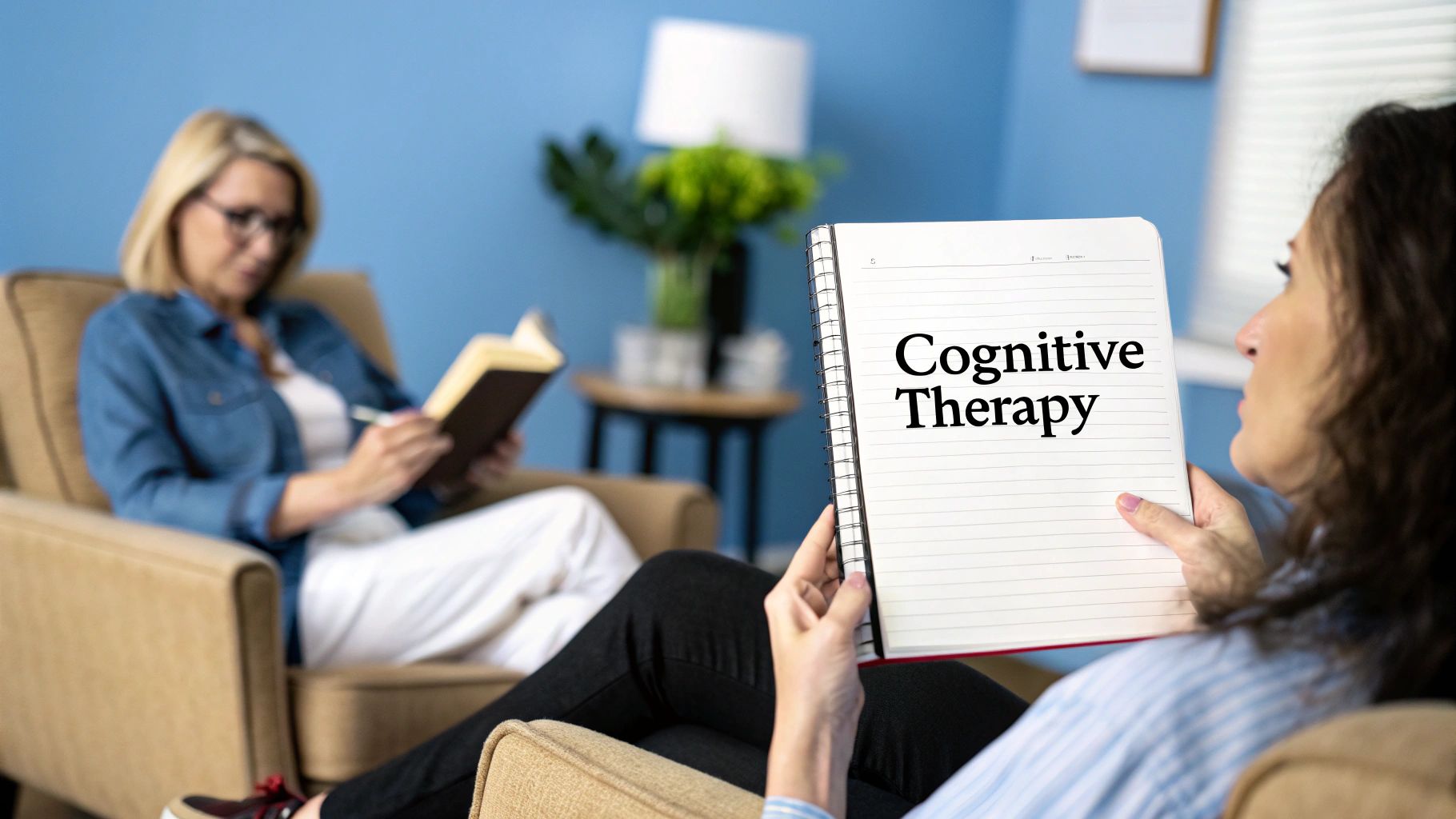
can help you build a personalized toolkit.
Key Insight: Mindfulness isn't about stopping your thoughts; it's about changing your relationship with them. You learn to observe them as a bystander instead of getting swept away by their current.
Releasing Tension Through Movement
Anxiety isn't just in your head; it lives in your body as physical tension. Progressive Muscle Relaxation (PMR) and gentle yoga are fantastic ways to physically let go of that stored-up stress.
Progressive Muscle Relaxation (PMR)
This technique is beautifully simple. You systematically tense, then relax, different muscle groups.
- Start with your feet. Squeeze those muscles tightly for about five seconds, then release them completely for ten seconds. Really notice the difference.
- Work your way up your body: calves, thighs, glutes, stomach, back, hands, arms, shoulders, and finally your neck and face.
- This contrast between tension and release is what makes PMR so effective. It teaches your body what deep relaxation feels like and makes you keenly aware of where you tend to hold stress.
These mind-body techniques are far more than just quick distractions. They are active, powerful skills that put you back in the driver's seat of your own physiology. They offer immediate relief and, with consistent practice, build the kind of lasting resilience that is central to any effective plan for anxiety treatment without medication.
Building Lasting Resilience Through Strategic Lifestyle Changes
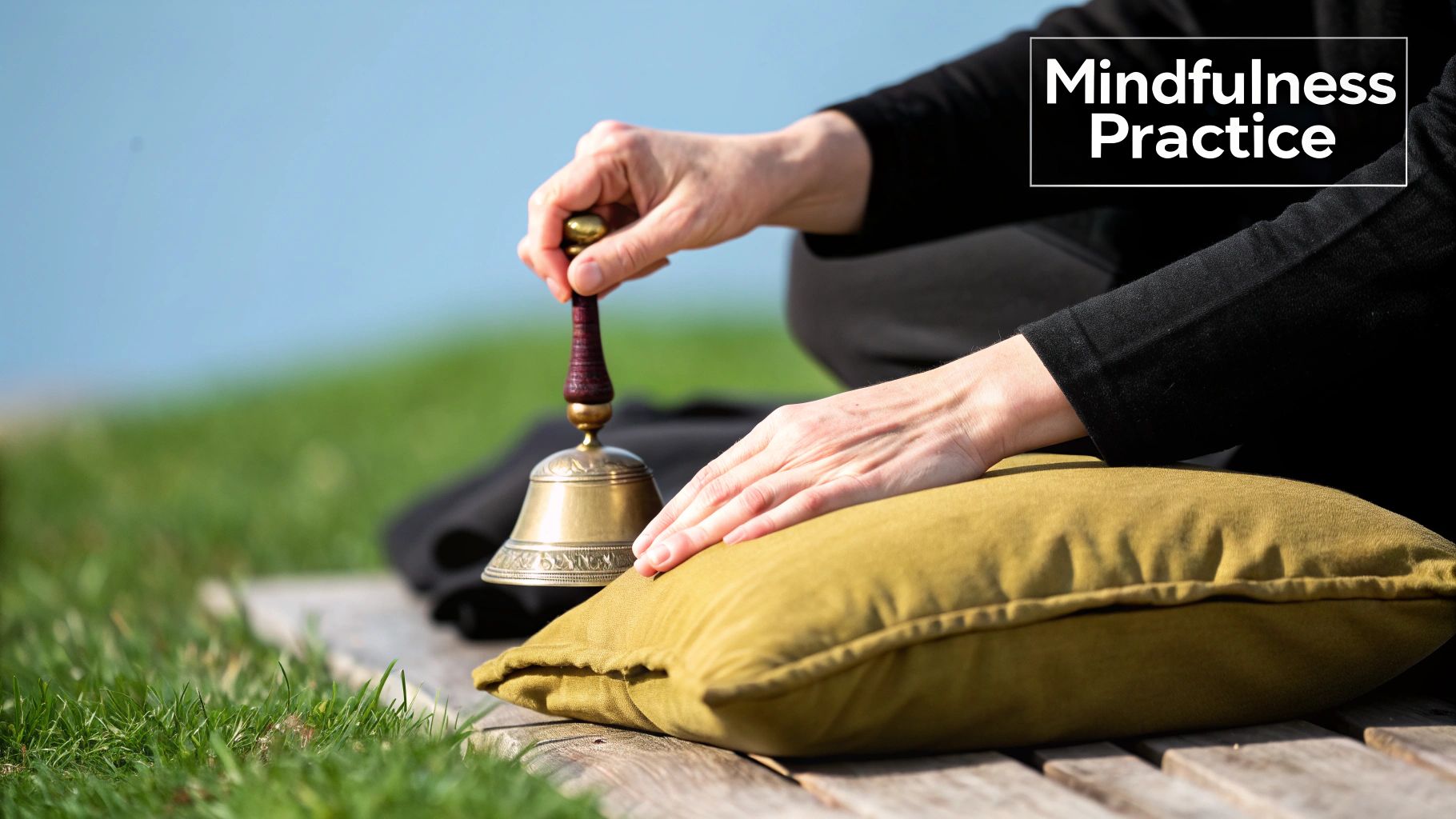
While targeted therapies and mind-body techniques are fantastic for managing anxiety as it arises, your daily habits are what truly build a foundation for long-term resilience. The most effective anxiety treatment without medication often begins with small, consistent tweaks to your lifestyle that create a powerful buffer against stress.
This isn't just about generic "eat well, sleep more" advice. It’s about understanding the deep physiological connections between how you move, eat, and rest, and how your mind responds. Think of your lifestyle as the soil in which your mental well-being grows. When the soil is nourished, a calm and steady mind can flourish.
Rebalance Your Nervous System with Physical Activity
We all know exercise is good for anxiety, but it’s more than just "burning off steam." Physical activity directly influences your brain’s neurochemistry, ramping up the production of feel-good neurotransmitters like endorphins and serotonin. More importantly, it helps down-regulate an overactive sympathetic nervous system—that "fight or flight" response that keeps so many of us in a state of high alert.
The good news? You don't need to run a marathon. Consistency trumps intensity every time.
- Aerobic Exercise: Aim for 20-30 minutes of brisk walking, jogging, cycling, or swimming, about 3-5 times a week. This rhythm has been shown to significantly dial down anxiety levels.
- Mindful Movement: Practices like yoga or tai chi are brilliant because they combine physical postures with deep breathing and mindfulness. This duo directly soothes the nervous system, releasing both physical tension and the mental chatter that fuels anxiety.
Even a simple 15-minute walk during your lunch break can be enough to interrupt a worry cycle. The real secret is finding something you actually enjoy, so it becomes a welcome part of your routine, not another chore on your to-do list.
Nourish Your Brain by Supporting Your Gut
The "gut-brain axis" is a hot topic for a reason—it's a game-changer for understanding anxiety. This two-way communication highway means that an inflamed, unhappy gut can send stress signals straight to your brain. On the flip side, a stressed-out brain can wreak havoc on your digestion.
A great place to start is by minimizing foods known to put you on edge. Pay attention to how you feel after consuming caffeine, refined sugar, and alcohol, as they are common triggers for jitters, unease, or even panic.
At the same time, you can start adding foods that actively promote a sense of calm.
Expert Tip: Instead of focusing on restriction, which can feel stressful in itself, reframe it as adding foods that help you feel good. For instance, incorporating more magnesium-rich foods can have a noticeably calming effect on the entire nervous system.
Look for opportunities to bring in these nutritional powerhouses:
- Magnesium-Rich Foods: Think leafy greens like spinach and kale, nuts and seeds like almonds and pumpkin seeds, and even high-quality dark chocolate.
- Probiotic Foods: Yogurt, kefir, kimchi, and sauerkraut help foster a healthy gut microbiome, which emerging research links directly to mood regulation.
- Omega-3 Fatty Acids: Found in fatty fish like salmon, plus walnuts and flaxseeds, these are essential building blocks for a healthy, well-functioning brain.
Master Your Sleep for a Rested Mind
Anxiety and sleep are caught in a frustrating feedback loop. Anxiety robs you of sleep, and sleep deprivation makes your anxiety a whole lot worse. This is why prioritizing sleep hygiene—the habits and environment that set you up for quality rest—is one of the most powerful forms of non-pharmaceutical anxiety treatment you can practice.
When your mind is racing at night, it feels impossible to wind down. The solution is to create a consistent and relaxing bedtime ritual that signals to your brain that it’s time to shift from a state of worry to a state of rest.
Your Restful Environment Checklist:
- Cool, Dark, and Quiet: Make your bedroom a true sanctuary for sleep. Blackout curtains, a white noise machine, or earplugs can make a world of difference.
- No Screens an Hour Before Bed: This one is non-negotiable. The blue light from phones and tablets suppresses melatonin, the crucial hormone that governs your sleep-wake cycle.
- Create a Wind-Down Routine: Spend the last 30 minutes of your day doing something calming. Read a physical book, do some gentle stretching, or listen to relaxing music.
- Stick to a Schedule: Try to go to bed and wake up around the same time every day—even on weekends. This helps regulate your body’s internal clock, making it easier to fall asleep and wake up naturally.
By making these strategic lifestyle changes, you’re not just chasing symptoms away. You are building a more resilient system from the ground up, empowering yourself to meet life’s challenges with a far greater sense of balance and calm.
Exploring Complementary and Alternative Options
When you're building a plan for anxiety treatment without medication, it’s smart to look beyond just the mainstream therapies. Many people find incredible relief by adding complementary practices into the mix. Think of these methods not as replacements, but as powerful allies that support your nervous system and amplify the benefits of your other efforts.
This is about creating a truly holistic strategy. For example, ancient practices like Traditional Chinese Medicine (TCM) don't see anxiety as just a brain issue. Instead, they view it as a signal that the body's core energy, or Qi, is out of balance. By working to restore that harmony, you can often find a deep sense of calm that touches both body and mind.
Finding Calm Through Acupuncture
A cornerstone of TCM, acupuncture has been a go-to for emotional wellness for literally thousands of years. It’s not just about pain relief. The practice involves placing incredibly thin needles at specific points on the body, which helps get your Qi flowing smoothly again.
From a modern scientific lens, we see that acupuncture does something remarkable—it seems to directly stimulate the nervous system. This prompts your body to release its own natural feel-good chemicals, like endorphins, which helps dial down the body's stress response.
Research has shown it can be especially helpful for Generalized Anxiety Disorder. Acupuncture helps shift you out of that constant "fight or flight" mode (the sympathetic nervous system) and into a state of "rest and digest" (the parasympathetic nervous system). Just make sure you find a qualified professional—look for credentials like L.Ac. (Licensed Acupuncturist) to know you’re in good hands.
A huge benefit here is that acupuncture gets to the root of the problem. Instead of just putting a bandage on the symptoms, it aims to correct the underlying imbalance. I've had countless patients tell me they feel a profound sense of relaxation on the table that stays with them long after the session ends.
If you're interested in a deeper dive, understanding the integration of Traditional Chinese Medicine for anxiety in a modern practice can be truly eye-opening.
Herbal Support for a Quieter Mind
Certain herbs and botanicals have a long history of helping the body handle stress. They tend to work differently than pharmaceuticals, offering a more gentle, nourishing effect that builds balance over time rather than forcing a sudden chemical shift.
Two of the most respected herbs for anxiety are:
- Ashwagandha: This is an adaptogen, which is a fancy way of saying it helps your body become more resilient to both physical and mental stressors. It's believed to help by keeping cortisol, our main stress hormone, in check.
- Chamomile: More than just a sleepy-time tea, chamomile contains a powerful antioxidant called apigenin. This compound binds to certain receptors in your brain that can help ease anxiety and pave the way for restful sleep.
A word of caution: always treat herbal supplements with respect. It’s crucial to talk with your doctor or a trained herbalist before adding something new to your routine. Herbs can interact with medications or have unexpected side effects, so it’s best to start with a low dose and see how your body feels.
The Soothing Power of Aromatherapy
Have you ever noticed how a certain smell can instantly change your mood? That's aromatherapy at work. Our sense of smell has a direct hotline to the limbic system, the emotional command center of our brain. Inhaling the right essential oils can trigger an almost immediate calming effect.
How to Use Essential Oils Safely for Anxiety:
| Method | Instructions | Best For |
|---|---|---|
| Diffusion | Add a few drops of oil to an ultrasonic diffuser with water. | Creating a calm, relaxing environment at home or work. |
| Inhalation | Put 1-2 drops on a tissue and breathe in deeply. | Getting quick relief when you feel a wave of anxiety coming on. |
| Topical Use | Always dilute with a carrier oil (like jojoba or coconut) before applying to your wrists or neck. | Personal, on-the-go scent and absorption through the skin. |
Lavender is probably the most-studied essential oil for anxiety, well-known for its ability to relax the nervous system. When you're shopping for oils, look for 100% pure, therapeutic-grade products. This ensures you're getting the real deal, free from synthetic fillers. These natural options can be powerful tools in your pocket, offering gentle but effective support on your path to a calmer life.
Answering Your Questions About Treating Anxiety Without Medication
When you start looking into treating anxiety without medication, it's completely normal to have a lot of questions. Stepping onto a new path for your mental health can feel a little uncertain, so let's clear up some of the most common concerns.
Think of this as a practical Q&A session, drawing from years of experience helping people just like you. The goal is to give you clear, honest answers so you can move forward with confidence.
How Long Does It Take to Feel Better?
This is usually the first question people ask, and the answer is quite different from what you'd expect with medication. Unlike a pill that can sometimes blunt symptoms fairly quickly, these natural approaches are all about building a solid foundation for long-term wellness. It’s a process of learning new skills and integrating them into your life, not an overnight fix.
Many people tell me they feel a real sense of progress and control within just a few weeks of consistent practice. For example, doing daily mindfulness or breathing exercises can give you immediate relief when stress spikes. You have a tool right in your pocket.
However, for the deep, lasting changes—like reprogramming the anxious thought loops we tackle in Cognitive Behavioral Therapy (CBT)—it’s more realistic to think in months, not days. Most people see significant, sustainable improvement over three to six months of dedicated work. It's a very personal timeline that really depends on how consistently you apply these new tools in your day-to-day life.
The Big Picture: We're not just trying to suppress symptoms; we're building skills. The time you put in now pays off in lifelong resilience, giving you a toolkit that will serve you long after any formal treatment period ends.
Can I Combine These Methods with Medication?
Absolutely. In fact, for many people, an integrative strategy that pairs therapy with medication is the most effective way to go. This approach creates a powerful synergy for healing.
Here’s how they can work together beautifully:
- Medication can help calm your nervous system and dial down the intensity of your symptoms. This often creates the stability you need to fully engage with the deeper work you’re doing in therapy.
- Therapy gives you the essential, long-term skills for managing anxiety. You learn to spot your triggers, challenge distorted thoughts, and regulate your emotions—tools that will always be yours, even if you eventually decide to taper off medication.
This combined strategy provides a really robust support system. The skills from therapy can actually enhance the benefits of the medication and prepare you for the future. The most important thing is to always discuss this with your healthcare provider. They can help you map out a safe and effective plan that’s tailored to you, ensuring both treatments work in harmony.
What if I Try Therapy and It Doesn’t Seem to Work?
This is a common fear, and it's so important not to get discouraged if your first experience isn't what you hoped for. Finding the right therapeutic path can sometimes take a little exploration. If it feels like it’s "not working," there are a few things to consider before you throw in the towel.
First, the connection you have with your therapist is everything. The therapeutic relationship is one of the single biggest predictors of a good outcome. If you don't feel seen, heard, or understood, it is perfectly okay—and honestly, often necessary—to find someone else. A good fit is feeling safe and supported.
Second, remember that different styles of therapy work for different people. If the structured, thought-focused approach of CBT doesn't click for you, another modality might be a much better fit.
- Acceptance and Commitment Therapy (ACT) could be a great alternative if you’re tired of struggling against your anxious feelings.
- Dialectical Behavior Therapy (DBT) might be perfect if you need concrete, practical skills for managing intense emotions.
Being open and honest with your therapist is key. When you tell them what isn't working, they can adjust their approach or even recommend a colleague who specializes in a method that might be better for you. Your wellness journey is yours alone, and finding the right guide is a critical part of the process.
At Eric Tsai Acupuncture and Herbs, we believe in a personalized, whole-person approach to wellness. If you're exploring how to treat anxiety without medication and are curious about how acupuncture and Traditional Chinese Medicine can support you, we invite you to learn more about our services. Visit us at drerictsai.com to see how we can help you restore balance and build lasting resilience.

